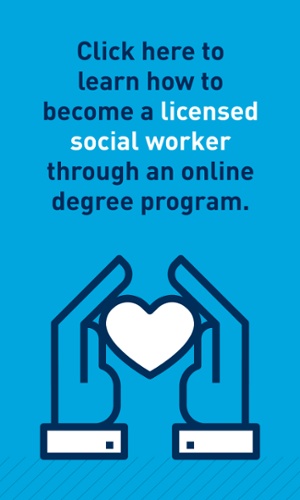
Forging real change through deep relationships, strengthening communities by strengthening individuals, and improving the well-being of families: Social workers do hero work, and it’s not an exaggeration to say that their services change the lives of untold numbers of people every day.
If you’re interested in supporting your community as a social worker, you need to know it’s not for the faint of heart. It’s also not an easy career path.
Fortunately, you’ll be prepared. Pursuing an engaging, comprehensive social work degree and understanding the state-specific social worker licensing requirements can prepare you to be the resource your community needs.
What Does a Social Worker Do?
Social workers are professionals tasked with guiding individuals, families, and communities with complex needs. Depending on the specialty or social worker career path, a typical day for a social worker may include:
- Providing drug and alcohol treatment to individuals struggling with addiction.
- Using trauma-informed care as a best practice.
- Providing support to at-risk students and encouraging them to stay in school.
- Providing assessment and psychotherapy in community centers.
- Researching, referring, and advocating for community resources for vulnerable and oppressed individuals and families.
- Connecting incarcerated individuals to reentry resources.
- Providing child welfare services, including adoption assistance.
- Developing services to help ensure clients can meet their basic needs.
- Advocating for local, state, and federal policy changes as needed.
Social workers work in rehabilitation centers, hospitals, schools, and governmental organizations. They go to the places where people experiencing hardships most need them.
This is not an easy career. If you are passionate about relieving suffering, improving quality of life, and offering valuable support to patients, clients, and communities, you must be prepared.=
Finding a high-quality social worker education program is the first of several steps in becoming a licensed clinical social worker.
Earn Your Bachelor of Social Work Degree
An accredited Bachelor of Social Work (BSW) degree is versatile and marketable. You can use it to pursue state social worker licensure, enter the workforce directly out of college, or seek an advanced degree.
Social worker education requirements include intensive coursework and senior-level, 400-hour field practicum experience in an agency. Some of the specific social worker practice areas covered through the MVNU BSW program include:
- Social Justice and Advocacy
- Social Science Research Methods
- Human Behavior and the Social Environment
- Social Work Practice with Organizations and Communities
- Analysis of Social Policy
But what about a social work bachelor’s degree versus a master’s degree? As it turns out, you have social work degree options that should make facilitating a career change or deepening your education an accessible way forward.
Already Have a Bachelor’s Degree? Earn Your MBA in Human and Social Services Leadership
Students who already have their BSW or a related bachelor's degree can broaden their horizons, prepare for career moves, and deepen the support they can provide through further education. With an MBA in Human and Social Services Leadership, graduates can pursue upper-level positions that affect social change and feel personally and financially rewarding.
This program includes in-depth coursework that focuses on non-therapeutic, direct services, such as:
- Secondary trauma support
- Ethical leadership
- Evidence-based practice and program evaluation
Through an advanced degree program, students prepare for more complex positions in nonprofit, governmental, and social services organizations.
How to Become a Social Worker: Further Educational and Certifying Steps
After you attain your degree, you’ll need to complete a few additional actions before you’re ready to apply for social worker positions. These include:
Field Experience
Getting hands-on experience and learning through real-world situations is an invaluable way to gain the skills necessary to be an excellent social worker. As part of your education, you’ll need to complete internships and field placements to experience and understand the challenges and rewards of your chosen profession. You’ll also gain a glimpse of the diverse settings in which you could work.
Licensing

The licensing process for social workers depends on where you live. Each state has specific requirements that social workers must meet before licensure. Often, candidates must pass an examination and fulfill a certain number of supervised work hours before being eligible to apply for their license. You can find out your state-specific requirements by checking out the website for your state’s board of social work.
Specializing
There are numerous subdisciplines within social work. It’s a good idea to determine which one you want to focus on, whether it’s clinical social work, child welfare, or medical social work. This will help you support specific populations more effectively and lay the groundwork for more targeted education and advanced roles.
Professional Development
Staying up to date with the latest developments in the field of social work will help you help your clients. To pursue a career as a social worker, you’ll need to commit to high-quality ongoing education through seminars, workshops, and courses. This isn’t just a requirement; it’s an opportunity. This ongoing education can help you build and nurture connections with professionals in your industry and advocates in your community.
Although getting a degree in social work is foundational for becoming a social worker, these stepping stones are indispensable as social workers further build their impactful careers. It’s a lot of work, but social work can be immensely rewarding when done well. And, fortunately, the job outlook for qualified social workers tends to be relatively stable.
What Are the Licensure and Job Prospects for Social Work Professionals?
The good news for students with a BSW degree is that they can qualify for licensure in many states.
Although a Master of Social Work (MSW) is required for independent clinical social work licensure, professionals who hold a BSW can dive into the field and enjoy a diverse range of employment opportunities that are vital to communities and positively impact the lives of those in need. According to the National Association of Social Workers, earning potential varies based on location, degree level, and specialty. Some of the positions in this field for a BSW-degree holder include:
- School social worker
- Children services worker
- Family advocacy representative
- Family preservation services coordinator
- Outpatient health specialist
- Parole officer
- Policy planning specialist
- Human service worker
- Information and referral specialist
- Job coach
- Legal service agencies
- Life skills counselor
- Behavioral management specialist
- Community outreach specialist
- Case manager
- Juvenile court liaison
- Victim advocate
- Probation officer
According to the Bureau of Labor Statistics (BLS), the social work profession is expected to grow by up to 7 percent through 2032, creating numerous opportunities for people with a BSW and a strong desire to promote social welfare, help families overcome challenges, advocate for change, and more. As far as the salary outlook for entry-level social work jobs goes, the BLS states that the 2022 median pay for social workers was around $55,000.
Want to Become a Social Worker? Find an Online Social Work Program from MVNU Online
At Mount Vernon Nazarene University, we're proud to offer online social work programs, including an online bachelor's degree that helps students achieve a professional position providing life-changing support to those in need.
Whether you're switching careers or starting fresh, the flexibility of online classes can help make balancing an in-depth curriculum and a busy schedule easier. Learn more about earning your accredited online social work degree with MVNU Online today.

